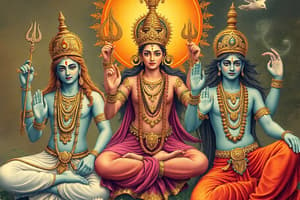Podcast
Questions and Answers
What does the scripture 'Vishnu Puran' state about India's geographical extent?
What does the scripture 'Vishnu Puran' state about India's geographical extent?
- India extends from the Indian ocean in the North to the Himalaya in the South.
- India extends from the Ganges River in the North to the Deccan Plateau in the South.
- India extends from the Himalaya in the North to the Indian ocean in the South. (correct)
- India extends from the Arabian Sea in the West to the Bay of Bengal in the East.
What natural boundaries does India have?
What natural boundaries does India have?
- Ganges River in the North and Indian Ocean in the South.
- Thar Desert in the West and Bay of Bengal in the East.
- Arabian Sea in the West and the Himalaya in the East.
- Himalaya in the North and sea in the East, West, and South. (correct)
What words are used at the beginning of an auspicious ceremony to refer to India?
What words are used at the beginning of an auspicious ceremony to refer to India?
- Bharatvarsha, Bharatkhand, Jambudwip, and Aryavarta. (correct)
- Gandhara, Kalinga, Magadha, and Vatsa.
- Patala, Kuru, Kosala, and Videha.
- Kosala, Anga, Vanga, and Magadha.
How is India's heritage transferred from generation to generation?
How is India's heritage transferred from generation to generation?
What is the significance of the mutual exchange with different countries?
What is the significance of the mutual exchange with different countries?
Flashcards are hidden until you start studying
Study Notes
India's Geographical Extent in Vishnu Puran
- The Vishnu Puran describes India as a vast region comprising various geographical features and diverse landscapes.
- It highlights the country’s northern mountains, specifically the Himalayas, which act as a protective barrier.
- The scripture emphasizes the river systems, including the Ganges and Indus, that have been central to India's agriculture and culture.
Natural Boundaries of India
- The formidable Himalayas form the northern boundary, providing protection from invasions.
- The Indian Ocean lies to the south, offering a maritime boundary that facilitates trade and cultural exchanges.
- To the west, the Thar Desert and the Arabian Sea establish natural borders with neighboring countries.
Auspicious Ceremony Terminology
- During auspicious ceremonies, India is often referred to as "Bharat" or "Hindustan," symbols of cultural identity and national pride.
- These terms reflect respect and reverence for the country's heritage and history.
Heritage Transfer in India
- India's heritage is passed down through oral traditions, rituals, and festivals that carry cultural significance.
- Educational institutions, family lineage, and community practices play crucial roles in preserving history and identity.
- Art, music, and dance forms serve as vital mediums for transmitting values and traditions to future generations.
Significance of Mutual Exchange with Different Countries
- Mutual exchange with various countries fosters cultural diversity and enhances India’s global identity.
- Trade relationships have historically led to sharing of ideas, technology, and cultural practices, enriching Indian civilization.
- Such exchanges promote economic growth and diplomatic ties, contributing to international harmony and cooperation.
Studying That Suits You
Use AI to generate personalized quizzes and flashcards to suit your learning preferences.




